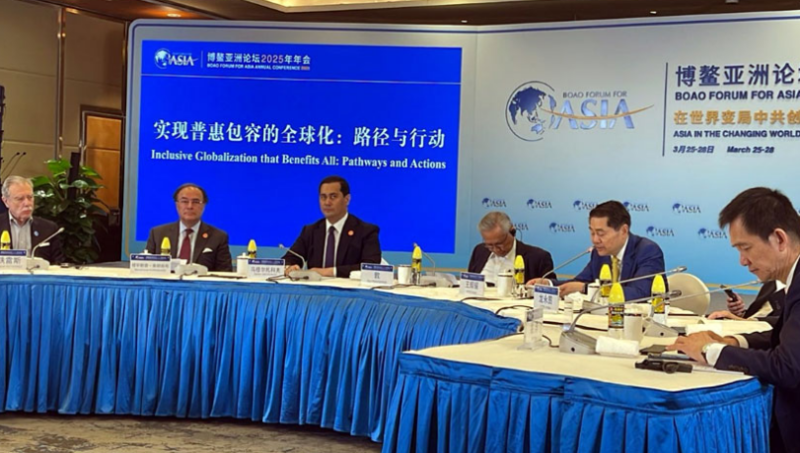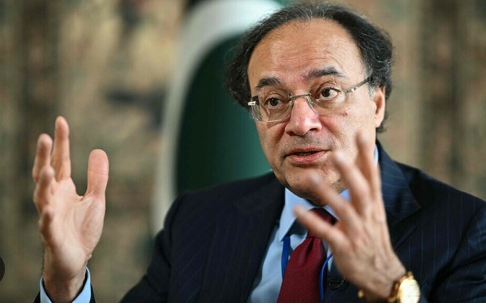Islamabad (Web Desk): Finance Minister Muhammad Aurangzeb has emphasized the urgent need for an inclusive approach to globalization that benefits all nations, particularly the developing economies.
He made this call while attending a high-level session titled ‘Inclusive Globalization That Benefits All – Pathways and Actions’ at the Boao Forum for Asia Annual Conference 2025 in China.
Muhammad Aurangzeb acknowledged the positive impact of globalization in lifting over one billion people out of poverty but pointed out that its benefits have been uneven, with developed countries reaping the most rewards while the Global South remains sidelined.
The minister emphasized the growing risks posed by protectionism, unilateralism, and trade wars, which he warned are deepening global divides and jeopardizing supply chains, ultimately undermining international cooperation.
“For globalization to endure, it must be restructured to allow fairer involvement from all nations, especially those hindered by restrictive trade practices and limited access to financial resources,” he said.
Muhammad Aurangzeb stressed that the time for mere dialogue and rhetoric had passed.

He called for decisive actions that promote a balanced model of globalization, one that fosters fair trade, sustainable economic growth, and more inclusive financial systems.
The current system, he argued, is marked by widening disparities, where developed nations continue to dominate high-tech industries, digital trade, and access to capital, while developing nations face barriers like high tariffs, restrictive investment policies, and inadequate infrastructure.
Highlighting Pakistan’s ongoing efforts, the minister mentioned the importance of regional cooperation and fairer market access.
He pointed to initiatives such as the China-Pakistan Economic Corridor (CPEC) and the Special Investment Facilitation Council (SIFC), which he believes are critical steps toward improving economic integration.
Aurangzeb also called for a united effort among developing nations to collectively demand fairer trade rules and a stronger voice in international financial institutions.
These alliances, he said, are necessary to challenge the restrictive policies that prevent developing economies from fully participating in global markets.
The minister also raised concerns over the ongoing challenges faced by Pakistan’s textile and agricultural sectors, which are significantly impacted by protectionist policies in developed countries and the imposition of non-tariff barriers that restrict their market access.
He reiterated the need for reforms in global financial systems to provide developing economies with greater financial flexibility, including the restructuring of sovereign debt mechanisms to prevent recurring debt crises that slow their growth.
Aurangzeb spoke at length about the potential of technology to address global inequalities, urging governments and international organizations to establish dedicated funds for AI and fintech development in the Global South to ensure digital inclusion.
He also highlighted the disproportionate impact of climate change on developing countries, noting that while they contribute less than 10% of global carbon emissions, they bear the brunt of climate disasters.
“Pakistan, contributing under 1% of emissions, has experienced devastating effects, such as the catastrophic floods of 2022, which caused $30 billion in damages and displaced 33 million people,” he said.
The finance minister called on developed countries to fulfill their climate finance commitments, pledging $100 billion annually, and to prioritize cooperation on renewable energy projects to help developing economies transition to low-carbon alternatives.
He also pointed out the need to reduce carbon-intensive trade barriers that disadvantage export-dependent economies in the Global South.
To further support the transition to a more sustainable future, he advocated for reforms in the global financial system, including enhanced Special Drawing Rights (SDR) allocations and the promotion of green bonds and blended finance models to attract private investment into emerging markets.
Finance Minister Aurangzeb reiterated that the future of globalization must be one of inclusivity and shared prosperity, where fair and equitable opportunities are available to all nations, particularly those currently on the margins of the global economy.


